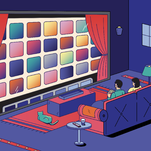
Universal Says On-Demand Film Strategy Has Increased Audience
In 2020, at the height of the pandemic, Universal Pictures and its art-house sibling, Focus Features, set off alarm bells in Hollywood by ending the long-held practice of giving theaters an exclusive window of about 90 days to play new movies. Instead, their movies, which have since included “Jurassic World: Dominion,” “Belfast,” “Cocaine Bear” and “M3gan,” would become available for digital rental or purchase — at a higher price — after as little as 17 days.
For a change-phobic industry that still views the 1981 arrival of armrest cup holders as a major innovation, the introduction of the service, known as premium video on demand, prompted extensive hand-wringing. Filmmakers and theater owners worried that ticket buyers would be more reluctant to leave their sofas if they could see the same films on their TV sets or iPads just a couple weeks later.
Universal’s competitors mostly stuck with the status quo.
But the willingness by Universal to experiment — to challenge the “this is how we’ve always done it” thinking — seems to have paid off. Universal has generated more than $1 billion in premium V.O.D. revenue in less than three years, while showing little-to-no decrease in ticket sales. In some cases, box-office sales even increased when films became available in homes, which Universal has decided is a side effect of premium V.O.D. advertising and word of mouth.
Universal, for instance, made “Minions: The Rise of Gru” available for premium V.O.D. after 33 days in theaters in 2022. The movie stayed in theaters after that, selling more tickets than “Minions,” released in 2015, did after 33 days, according to data from Comscore, an analytics company. Data for Universal’s “Jurassic World” and “Fast and Furious” franchises shows a similar effect.

